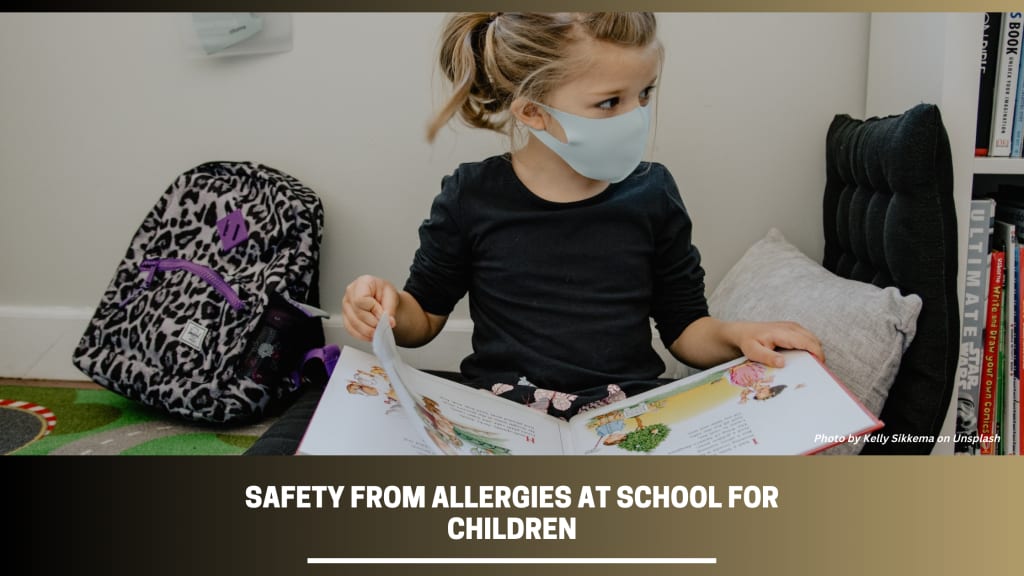Safety from Allergies at School for Children
If you are the parent of a young child who has food or other sensitivities, there are several things you can do to not only keep your child safe at school but also to feel at ease when you leave.

Sending a child to school while knowing they are vulnerable to dangers such as allergic reactions can be stressful, especially for young children who may not be fully capable of regulating what they eat and touch. If you are the parent of a young child who has food or other sensitivities, there are several things you can do to not only keep your child safe at school but also to feel at ease when you leave.
Do Your Research
As a parent, you understand your child's allergies, which is the first step toward keeping your child safe at preschool with the help of assistive technology for preschoolers. If it's a new allergy, learn about it and which activities and foods are hazardous to them. For example, if your child has a dairy allergy, make a list of common foods and snacks to avoid for teachers and carers. Research, especially when it comes to childcare, can be beneficial. Looking at a childcare program’s policies and accommodations for children with allergies can help you better inform your child of what to do while at school.
Inform Childcare Staff and Teachers
The most important step you can take when sending your preschooler to school with allergies is to inform the leadership staff and teachers. Know which teachers have the most influence over your child during the day, and make sure they are aware of your child's food allergies. Developing a relationship with your child's teachers will assist them in remembering their sensitivities. Additionally, speak with the school's nurse or chef.
Have an Emergency Plan
It can be frightening to think about what might happen if your child has an allergic reaction, but by developing an emergency plan, you and your child's teachers will be better prepared. Here is a useful form that can be given to teachers and carers. Give this document to teachers, along with any medication required to treat your child's condition if a reaction occurs. This can include epinephrine, an inhaler, or anything else your child's paediatrician suggests. Make certain that your preschool teachers understand how to use this medication and what to expect afterward. The document includes symptoms to be aware of, recommended treatment, medication type and dosage, and any general medical information that will be useful to childcare staff and emergency responders. Being on the same page as carers is the most effective way to ensure school safety!
Start Meal Planning for Children with Food Allergies
This point is especially important for children who are unable to self-regulate. If eating school lunches seems like too much of a risk for you and your child, you can always pack their lunches. Even better, involve your children in the cooking process and educate them on what makes the food they pack for lunch safe to eat and what foods are potentially harmful. Check out this article for more information on the advantages of cooking with children. This discourages children from trading food with other children, as students may give or receive potentially harmful allergens. If you don't have time to pack your child's lunch, talk to the lunch staff at his or her school about how they can better accommodate your child's needs. When it comes to children with allergies, you might be surprised at how kind and helpful the lunch staff can be. During lunch, informed teachers can provide supervision.
Take Steps to Prevent Bullying
Talk about bullying with your child's preschool teacher. Teachers are best equipped to detect social shifts in their classrooms and to promote positive environments through preschool interactive activities. Ask them to keep an eye out for signs of bullying in your child and their friends. If you want to take a more proactive approach with young children, you're in luck because kids are easy to please. Bring snacks for the teacher to distribute, and ask her to explain that the snack they received is allergy-free, but that some foods can be dangerous for certain students. This aids in the introduction of allergies to young children in a fun and enjoyable manner.
Teach Self-Management Skills
Just as it is critical for parents to be informed about their toddler's allergies, it is also critical for children to be informed, particularly as they grow older and are given more responsibility for regulating their contact with allergens. Explain to them, without sugarcoating or scaring them, what might happen if they come into contact with something dangerous to them. It is also beneficial for them to understand what to do if they begin to experience symptoms and what these symptoms may resemble. This allows them to better describe what is happening to teachers when they are itchy, having difficulty breathing, or experiencing other symptoms. Your children should not be afraid of their allergies, but rather confident that they know what to do if they have one. This self-assurance and personal responsibility will increase the likelihood that your child will make sound decisions.
A few preventative measures can mean the difference between a safe and potentially hazardous environment. The most important thing you can do for your allergic child is to be proactive and informative until they are old enough to self-manage and problem solve on their own. Take a deep breath and put your trust in your child's preschool teachers, yourself, and, most importantly, your child.
About the Creator
Amit Kumar
Full-time thinker & part-time writer...






Comments
There are no comments for this story
Be the first to respond and start the conversation.